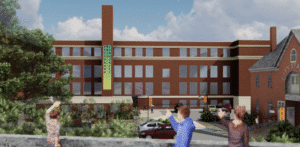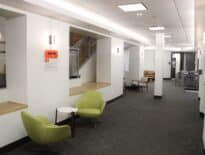
The new Fitchburg Arts Community demonstrates a potential playbook for successful financing of housing through public subsidies in Massachusetts’ Gateway Cities. Image courtesy of ICON Architecture
In the 19th century, Fitchburg was a mill town where factories along the Nashua River manufactured textiles and paper products. Many of the factories are gone now, but today’s Fitchburg is home to impressive Victorian architecture, an MBTA commuter rail station, Fitchburg State University and the Fitchburg Art Museum.
The art museum is a valuable cultural asset to northern Worcester County, with over 7,000 pieces, including 19th century American art, African art and photography. Thanks to the vision and perseverance of key members of Fitchburg’s nonprofit and creative communities, the museum will soon share its neighborhood with the Fitchburg Arts Community (FAC), a housing development offering 68 affordable apartments for artists and other creative individuals. It is expected to open early next year.
The FAC’s developer, NewVue Communities, is a Fitchburg-based nonprofit community development corporation that promotes housing and small business growth in north central Massachusetts. The FAC is the brainchild of NewVue’s executive director Marc Dohan and the art museum’s director Nick Capasso, who envisioned converting nearby abandoned historic school buildings and a stable into artist housing.
The $45 million project broke ground last fall, after securing traditional bank construction financing, support from MassDevelopment’s Transformative Development Initiative (TDI) program for Gateway Cities, and low-income housing and historic rehabilitation tax credits.
Eastern Bank Reinvests in a Gateway City
NewVue acquired the FAC’s site from the city of Fitchburg and a private owner several years ago for a modest price. Last year, NewVue transferred the site to an affiliated for-profit limited liability company. Eastern Bank committed $26 million in construction financing. Commitments like that explain how Eastern Bank earned an “outstanding” rating from the Massachusetts Division of Banks under the Community Reinvestment Act.
The TDI program and tax credits attracted additional project financing. The commonwealth of Massachusetts arranged for $7.2 million of syndicated financing from several governmental and quasi-governmental agencies. NewVue obtained a $3.9 million state Low-Income Housing Tax Credit loan and a $7.4 million state historic tax credit loan, and also invested $4.1 million from a MassDevelopment Brownfields Grant, another grant from the Fitchburg Redevelopment Authority, and its own capital campaign.
The tax credits are the most complicated aspect of the FAC project. Investors relying on them should seek expert tax advice before proceeding. The federal Low-Income Housing Tax Credit (LIHTC) program offers tax credits to investors who provide funding for affordable housing developments. The state Executive Office of Housing and Livable Communities manages this program in Massachusetts, in addition to a separate but similar state tax credit program.
According to the commonwealth’s website, eligible investors can qualify for tax credits of up to 9 percent. But available tax credits are limited. The maximum tax credit award is generally $1 million per project, but EOHLC may award up to $1.3 million in credits for larger scale projects considered more transformative for the surrounding neighborhood.
The historic rehabilitation tax credit can offset up to 20 percent of a developer’s expenditures to rehabilitate an historic building. Qualifying projects must be certified by the Massachusetts Historical Commission. The credit is earned when the completed project is placed in service. However, the commonwealth cannot authorize more than $55 million towards this tax credit annually, so investors must go through an approval process to qualify. The program is scheduled to expire in 2027.

Christopher R. Vaccaro
A Spread of Incomes
To ensure that the FAC’s apartments in Fitchburg remain affordable in perpetuity, the project is subject to an affordable housing restriction, limiting rents and requiring that tenants’ income not exceed certain thresholds. Under this restriction, 21 apartments are now set aside for tenants earning up to 110 percent of area median income (AMI) but that percentage may change, 31 apartments for tenants earning up to 60 percent of AMI, two apartments for tenants earning up to 50 percent of AMI and 14 apartments for tenants earning up to 30 percent of AMI. NewVue is responsible for ensuring that only tenants within those income limits reside at the project. These restrictions are necessary for investors in the FAC to qualify for low-income housing tax credits.
New Vue’s Marc Dohan of NewVue said the project “is a great win for Fitchburg and the region. It creates desperately needed housing, and preserves three historic buildings by putting them on the National Register of Historic Places, all while taking advantage of Fitchburg’s diversity, history, walkability and strong cultural institutions. It will bring dozens of creative artists and entrepreneurs to our region.”
Dohan’s efforts might have a positive impact beyond developing affordable apartments in Fitchburg, if Massachusetts community development corporations can follow his playbook in other Gateway Cities.
Christopher R. Vaccaro, Esq. is a partner at Dalton & Finegold L.L.P. in Andover. His email address is cvaccaro@dfllp.com.






